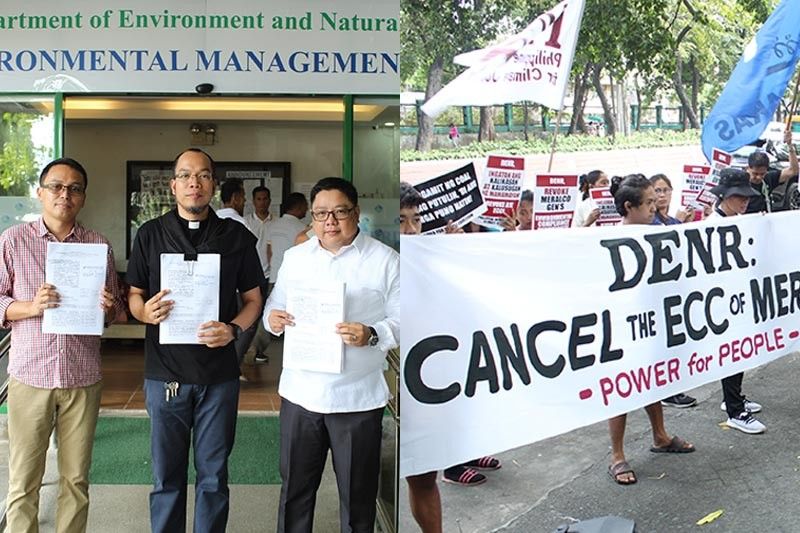Green groups, Quezon locals file petition vs Atimonan coal plant ECC

MANILA, Philippines — Environmental advocates and Quezon residents this week filed a petition at the Department of Environment and Natural Resources to cancel the Environmental Compliance Certificate issued to Atimonan One Energy (A1E) Incorporated’s coal-fired power plant project or CFPP in response to “breaches to environmental and community education requisites.”
The complainants include representatives of Quezon for Environment, Atimonan Power to the People, Center for Energy, Ecology, and Development (CEED) Incorporated, Philippine Movement for Climate Justice Incorporated, and Sanlakas.
Unauthorized tree-cutting
“A1E has been cutting or earth-balling coconut trees in the project site without a valid permit to cut as required,” the complaint sent to Philstar.com Wednesday, but received by the DENR Monday, read.
A1E is a wholly-owned subsidiary of Meralco. It is the proponent of the contested 1200-megawatt CFPP in Atimonan, Quezon.
CEED requested from the Philippine Coconut Authority certified true copies of A1E’s permit to cut coconut trees in the project site, but only received eight permits between August 2016 and March 2017.
“After 14 March 2017, no other permits were issued to A1E,” the complaint read.
Lawyer Avril De Torres, legal counsel of the Power for People (P4P) Coalition, said Atimonan residents observed a significant loss of coconut trees since August this year.
“Since there are no placards and the last permit from PCA has already expired, residents are concerned that land clearing is being done illegally,” De Torres said in a release.
In addition to the alleged unauthorized tree cutting, the Power for People (P4P) Coalition said A1E cut nearly 3,500 coconut trees and thousands of trees of different species during permitted tree cutting operations between 2016 and 2017.
CEED also requested certified true copies of A1E’s tree-cutting permits from the DENR’s Environmental Management Bureau and found the latest permit was issued on July 23 with 50 days effectivity.
“It is clear that after 10 September 2019, A1E no longer has any permit to cut or earth-ball any vegetation in the project site,” the complaint read.
CEED Executive Director Gerry Arances said that a tree cutting of a wide magnitude for the CFPP, permitted or not, has tremendous long-term environmental consequences.
“As early as 2011, coconut trees have been found to have a high carbon storage capacity at 24.1 tons of carbon per hectare per year. It is lamentable that Meralco Gen is removing this natural carbon sequestration system in order to replace it with a facility that sets loose large amounts of pollutants into the air,” Arances said.
Environmental group Greenpeace last week said coal expansion by the Philippines' leading energy companies, including Meralco, will trap the country in at least two more decades of "overreliance on fossil fuels" and hinder a transition to a low carbon future.
Stakeholders left out
Complainants also claimed the company failed to comply with the Information, Education, and Communication program required by the ECC.
“The ECC issued to A1E in 2015 clearly stated specific requirements before they are able to clear land, and that an Information, Education, and Communication (IEC) program should be conducted to ensure that all stakeholders, especially local residents, fully understand the risks posed by the project and what A1E’s proposed mitigating measures are,” De Torres said.
CEED informed the complainants, Atimonan residents, and other Quezon locals about the said IEC program but it reportedly “came as a surprise” to them.
Expected result
De Torres, also Research, Policy, and Law Program Head of CEED, said the complainants hope for a different result from the 2015 petition filed by Atimonan residents calling to cancel the ECC.
“I cannot say exactly if this is a different result from 2015 because we still have not received a copy of the 2015 case from the DENR. But to my understanding, based on what was shared by community members, this is a different case,” the lawyer told Philstar.com Wednesday.
“The 2015 petition argued that the ECC was irregularly issued. This petition argues that there has been violations of the ECC.”
DENR officials are facing charges of red tape at the Office of the Ombudsman filed by CEED earlier this month for failing to respond to a request of copies of all the records related to the 2015 petition.
P4P liaison Aryanne De Ocampo told Philstar.com Wednesday that only some of the requested documents were provided by two DENR offices following the complaint.
Meanwhile, Executive Order 30 is fast-tracking the controversial Atimonan CFPP, which poses a range of environmental and economic sustainability issues, according to an infographic on the project prepared by CEED and the Power for People Coalition.
EO 30 created the Energy Investment Coordinating Council to streamline the regulatory procedures affecting energy projects.
It defines Energy Projects of National Significance as "major energy projects for power generation, transmission and/or ancillary services including those required to maintain grid stability and security, identified and endorsed by the [Department of Energy]."
Energy projects need to possess any of the following attributes:
- Significant capital investment of at least P3.5 billion
- Significant contribution to the country's economic development
- Significant consequential economic impact
- Significant potential contribution to the country’s balance of payments
- Significant impact on the environment
- Significant infrastructure requirements.
- Complex technical processes and engineering designs
Philstar.com has attempted to reach A1E for comment and is waiting for their response as of writing.
- Latest
- Trending

































